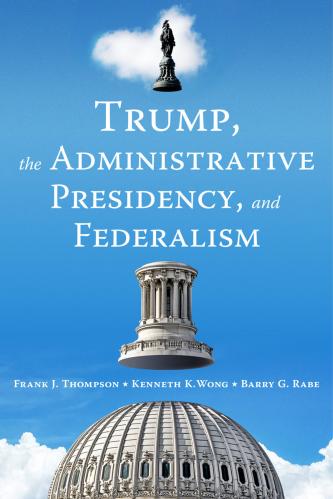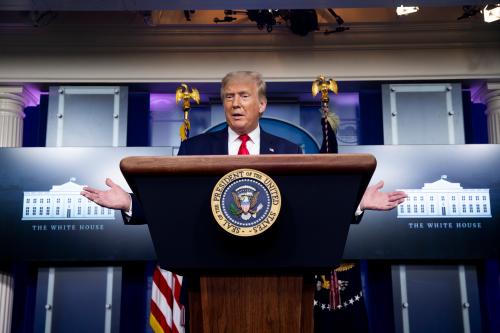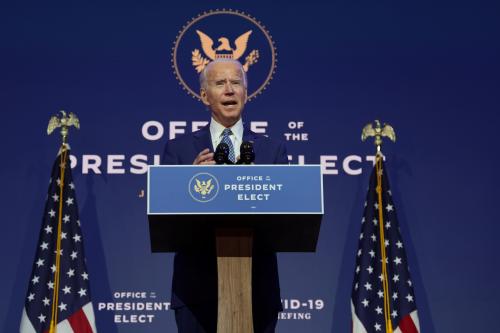Within the first moments of his speech acknowledging the news that he won the presidential election, Joe Biden heralded a good day for educators. He took the opportunity to acknowledge the educational contribution of Dr. Jill Biden, community college professor and soon-to-be first lady. Biden’s commitment to education is visibly displayed in many of the 49 action plans posted on his website.
But the incoming Biden-Harris administration faces major policy and political challenges in the education realm, many of which stem from President Trump’s unilateral action to reduce federal involvement in American schooling. The Trump team primarily pursued a strategy of rolling back initiatives launched by the Obama administration that promoted systemic racial equality, protected student rights, and strengthened state and district capacity.
President Trump’s disengagement has created broader policy challenges for the Biden administration as well. The nation’s schools are stretched beyond their capacity to deliver remote instruction and ensure student safety during the pandemic. State budgetary shortfalls will need timely federal assistance. Across thousands of local communities, the Black Lives Matter movement has inspired a racial justice agenda, with clear ripple effects on public schools. Political support for the Biden agenda seems unpredictable as the public sends mixed signals on divided governance.
Taking into account candidate Biden’s policy platform, the current policy challenges, and the governing landscape in 2021, I see the Biden-Harris administration likely to focus on several priority areas related to American schooling.
Tame the pandemic and invest in innovation
Confronting the pandemic is Biden’s primary education issue beginning on Jan. 20, 2021. Biden has repeatedly announced that he wants to shut down the virus so he can safely reopen schools and the economy. The Biden administration has relied on the nation’s top health experts to develop effective anti-pandemic strategies and establish national guidelines to restore the nation’s economic and social life. The new administration will need to strengthen its partnership with states and districts to ensure school safety and to implement strategies that narrow the widening learning gap associated with the pandemic—especially in racially or economically marginalized communities.
Recent research found a significant gap in mathematics arising during the pandemic. Clearly, the Biden administration will need to act swiftly to work with states and districts to start addressing the gap in teaching, connectivity, resources, social-emotional well-being, and student engagement. In the absence of federal support, the achievement gap and children’s nonacademic needs are likely to grow. Drawing on lessons from the State Fiscal Stabilization Fund of the 2009 American Recovery and Reinvestment Act, the Biden administration may launch an education-focused package to ensure school safety, stabilize teacher employment, strengthen bandwidth for remote and hybrid learning, and prioritize educators to receive vaccines.
The Biden team is well positioned to simultaneously manage the next few months of the pandemic and the next generation of learning systems through investments in governmental capacity. The Biden administration may incentivize health and education agencies to share data, coordinate resource allocation, streamline communications, engage parents and communities, and deploy rapid response teams to combat hot spots. Equally important, Biden is well positioned to make significant investment in remote and hybrid learning, pilot new schooling models with flexible schedule and spatial design, and, at the secondary and postsecondary levels, promote cross-institutional collaboration to meet the educational challenge of the global system in the 21st century. These investments may potentially transform teaching and learning by lessening the constraints bounded by place and time. The post-pandemic period may usher a new system of schooling delivery to address inequality of access by zip code and income and racial segregation.
Fight systemic racism
The Biden presidential campaign is closely connected to the hopes and strength of the Black community as articulated in the overwhelming Black support that Biden received throughout the presidential race. The Biden presidency is likely to use executive and administrative tools to reverse the erosion of systemic oversight in civil rights and diversity issues. During the Trump years, the Department of Education’s Office for Civil Rights has reduced its reporting requirements and its enforcement activities. It withdrew Obama-era guidelines designed to reduce racial and other discrimination in the implementation of school disciplinary actions. The Trump administration sought to restrict the ability of student borrowers to sue loan-service contractors under state law, and it rescinded Obama-promulgated regulations to penalize for-profit vocational schools that had failed to attain employment targets for their graduates.
The Biden presidency has the opportunity to collaborate with historically Black colleges and universities (HBCUs), Hispanic-serving institutions (HSIs), and tribal colleges to address systemic inequality. In this regard, Trump’s effort was piecemeal. With support from Congress, the Trump administration wrote off loans incurred by several HBCUs to repair damages caused by Hurricane Katrina and made federal STEM funding in HBCUs permanent. The Biden administration is likely to adopt a more comprehensive approach that links K-12 and postsecondary opportunities for the Black community. As a graduate of Howard University, Vice-President-elect Kamala Harris is uniquely positioned to shape federal investment in Black-focused initiatives, including medical education and research, legal training, workforce development, and business and social work.
Human capital investment strategies
Biden’s agenda calls for new strategies in human capital investment. First, the federal government can scale education initiatives that are embraced by a number of states and districts. For example, several governors and mayors implement pre-K programs; strengthen the quality and the range of skills-based programs in community colleges; invest in STEM education; and partner with higher ed institutions to ensure teacher education programs adopt high-quality standards that are meeting the needs of a growingly diverse population.
Second, the federal government can lead and incentivize innovative practices. In this regard, a critical area that matters in the long run is evidence-based research, which has historically received modest federal support. However, well-executed research has contributed to high-impact strategies and practices in teacher quality, student applications for college financial aid, special education, early childhood education, and charter schools, among other areas. Consistent with multilateralism, the Biden team can take a leading role in international benchmarking. The Biden presidency has an opportunity to narrow the research-practice gap by investing in the R&D functions of the Department of Education.
Deliver new legislation in higher education
Trump’s general lack of interest in higher education has further delayed the reauthorization of the Higher Education Act, which has been due since 2014. To be sure, building a legislative coalition is complicated by limited federal authority and strong nonpublic partners in higher education. Reauthorization efforts were stalled even when the Senate HELP Committee’s chair, Lamar Alexander (R-Tenn.), and its ranking member, Patty Murray (D-Wash.), demonstrated bipartisan cooperation. Clearly, presidential leadership is needed. Biden seems ready to apply his legislative skills and coalition-building experience to craft a bipartisan, omnibus bill.
The Biden administration is likely to propose an omnibus higher education bill that improves access, affordability, inclusion, and accountability. Access and affordability would require an expansion of Pell Grants, which currently are set at $6,345—not nearly enough to cover the average cost for tuition and fees at a public institution. These policy aims will call for federal loan forgiveness based on income eligibility, veterans’ support, teacher education enhancement, and investment in HBCUs, HSIs, and tribal colleges. New guardrails will be needed to ensure student borrowers’ rights—including about 350,000 borrowers with disabilities—civil rights, gender equity, and victims’ rights for those who have endured sexual harassment or assault on school campuses. Potentially new federal funding will focus on diversity and STEM, while FAFSA application and verification will be more customer friendly.
Biden’s proposal on student loan forgiveness is likely to be favorably received by the higher educator sector, as many colleges and universities have already put in place loan-free programs based on income eligibility. The Biden administration is likely to form multilateral partnerships to promote freely accessible two-year colleges, scaling similar programs that are implemented in Rhode Island and several states. Community colleges, as critical pathways toward economic mobility, will receive particular attention given Dr. Jill Biden’s decades of experience in this area.
Return to responsible governance
The Trump presidency had an adversarial and chaotic relationship with the education community. For example, Secretary Betsy DeVos or her Department of Education have been sued in 455 lawsuits—the most ever in the history of the department, according to an analysis by The 74. This includes eight multistate suits. Most of the complaints focused on student borrowers’ rights, gainful employment, and civil rights. As a comparison, there were 356 cases brought against the Education Department or the secretary of education during Obama’s two terms combined, including zero multistate lawsuits.
Recognizing an urgency to restore responsible governance to address multiple crises, the incoming Biden presidency signals a strong commitment to engage diverse stakeholders and subject-matter experts. Biden’s education agenda will need a broad coalition beyond the Beltway that includes civil rights leaders, governors, mayors, teachers’ unions, state legislative leaders, innovative practitioners, higher education leaders, and civic and business stakeholders. Guided by a clear moral compass to serve all students and their families, president-elect Biden will be able to steer the nation toward educational progress.







Commentary
The Biden presidency and a new direction in education policy
December 17, 2020